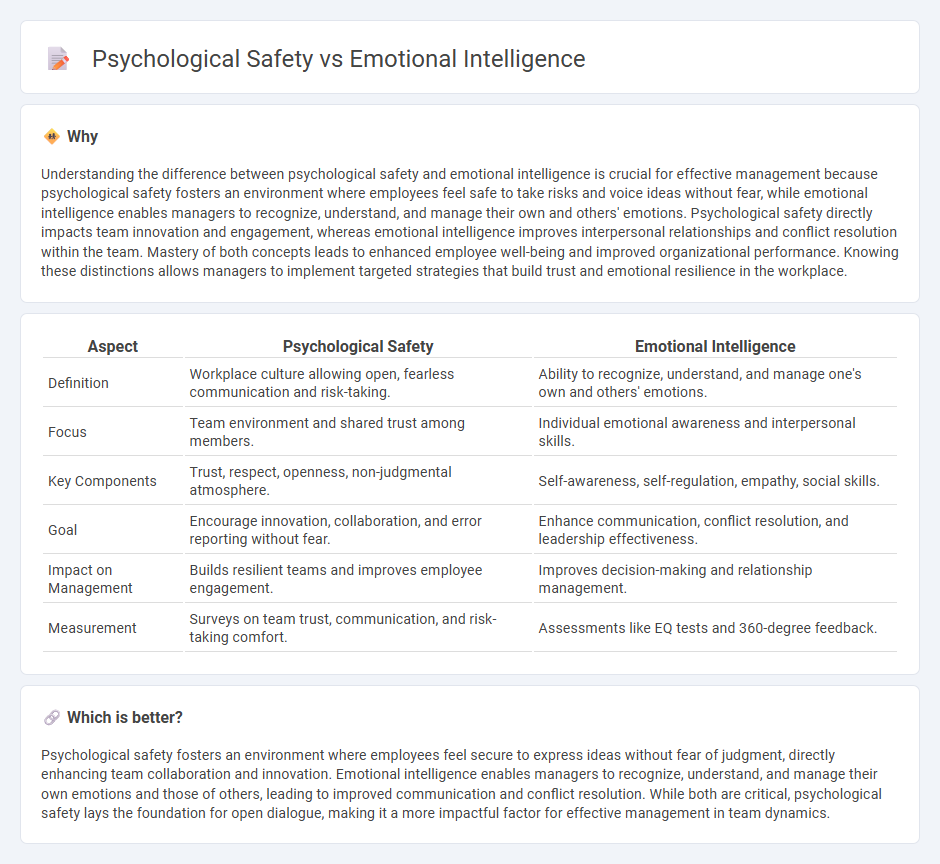
Psychological safety fosters an environment where team members feel secure to express ideas without fear of judgment, promoting collaboration and innovation. Emotional intelligence enables leaders to understand and manage their own emotions while empathizing with others, enhancing interpersonal relationships and conflict resolution. Explore how integrating psychological safety and emotional intelligence can transform management practices for greater organizational success.
Why it is important
Understanding the difference between psychological safety and emotional intelligence is crucial for effective management because psychological safety fosters an environment where employees feel safe to take risks and voice ideas without fear, while emotional intelligence enables managers to recognize, understand, and manage their own and others' emotions. Psychological safety directly impacts team innovation and engagement, whereas emotional intelligence improves interpersonal relationships and conflict resolution within the team. Mastery of both concepts leads to enhanced employee well-being and improved organizational performance. Knowing these distinctions allows managers to implement targeted strategies that build trust and emotional resilience in the workplace.
Comparison Table
| Aspect | Psychological Safety | Emotional Intelligence |
|---|---|---|
| Definition | Workplace culture allowing open, fearless communication and risk-taking. | Ability to recognize, understand, and manage one's own and others' emotions. |
| Focus | Team environment and shared trust among members. | Individual emotional awareness and interpersonal skills. |
| Key Components | Trust, respect, openness, non-judgmental atmosphere. | Self-awareness, self-regulation, empathy, social skills. |
| Goal | Encourage innovation, collaboration, and error reporting without fear. | Enhance communication, conflict resolution, and leadership effectiveness. |
| Impact on Management | Builds resilient teams and improves employee engagement. | Improves decision-making and relationship management. |
| Measurement | Surveys on team trust, communication, and risk-taking comfort. | Assessments like EQ tests and 360-degree feedback. |
Which is better?
Psychological safety fosters an environment where employees feel secure to express ideas without fear of judgment, directly enhancing team collaboration and innovation. Emotional intelligence enables managers to recognize, understand, and manage their own emotions and those of others, leading to improved communication and conflict resolution. While both are critical, psychological safety lays the foundation for open dialogue, making it a more impactful factor for effective management in team dynamics.
Connection
Psychological safety fosters an environment where team members feel secure to express ideas and take risks without fear of negative consequences, which is crucial for effective management. Emotional intelligence enables leaders to perceive, understand, and manage emotions, promoting empathy and trust within the team. This interconnected dynamic enhances collaboration, innovation, and overall organizational performance.
Key Terms
Self-awareness
Emotional intelligence centers on self-awareness as the ability to recognize and understand one's own emotions, which enhances decision-making and interpersonal relationships. Psychological safety fosters an environment where individuals feel secure to express themselves without fear of judgment, indirectly supporting self-awareness by encouraging open reflection. Explore how developing self-awareness within these frameworks boosts personal growth and team dynamics.
Trust
Emotional intelligence enhances interpersonal awareness and empathy, which are critical for building trust within teams, while psychological safety creates an environment where individuals feel secure to express ideas and take risks without fear of negative consequences. Trust acts as a foundational element that bridges emotional intelligence and psychological safety, fostering open communication and collaboration. Discover how strengthening trust can transform team dynamics and performance by exploring further insights.
Open communication
Open communication fosters emotional intelligence by encouraging awareness and regulation of emotions within interpersonal interactions. Psychological safety relies on open dialogue to create an environment where individuals feel secure sharing ideas without fear of negative consequences. Explore how mastering open communication strengthens both emotional intelligence and psychological safety in teams.
Source and External Links
Emotional Intelligence - Emotional intelligence (EI) is the ability to perceive, use, understand, manage, and handle emotions, crucial for effective personal and social interactions.
Spotlight: What it means to be emotionally intelligent - Emotional intelligence involves attributes like self-management and self-awareness to make constructive decisions and manage emotions effectively.
What is emotional intelligence and how does it apply to the workplace - Emotional intelligence encompasses self-awareness, self-regulation, motivation, empathy, and social skills, enhancing interpersonal relationships and workplace performance.
 dowidth.com
dowidth.com